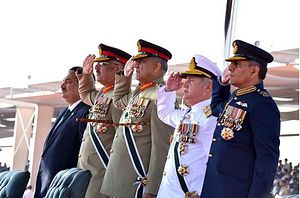Pakistan’s chief of army staff (COAS), General Qamar Javed Bajwa, recently marked two years in the all-powerful position. At his appointment, Bajwa was dubbed as pro-democracy and holding a “relatively more moderate view of the relationship with the civilian government” among a military known for its pathologic disdain of all things civilian. Since assuming his post, however, he has effectively upended any democratic gains that Pakistan had made following the ouster of its last formal military dictator, General Pervez Musharraf, in 2008.
The Pakistan army is an institutional monolith – its apples don’t fall far. Bajwa has been no exception. The Pakistani COAS has led a creeping coup d’état started by his predecessor, General Raheel Sharif, to its culmination. The 57-year-old infantryman has virtually reclaimed all the ground lost to civilian political forces over the past decade. In Bajwa’s tenure, Pakistan’s civil-military balance – perennially lopsided in favor of the army – was firmly tilted toward the latter yet again.
While the Pakistan army has attempted to trip democracy every step of the way since its restoration in 2008, this effort took on a particular urgency under COAS Sharif. Raheel Sharif’s director general of the Inter-Services Intelligence Directorate tried to bring down the three-time elected Prime Minister Nawaz Sharif (no relation) through an orchestrated street protest by the army’s political proxies. Then the army under Bajwa resorted to full-blown political and judicial engineering to oust Nawaz Sharif and keep him out of the political arena for good.

































